Renewable energy provided more than 60,000 jobs to the Inland Empire, study finds.
Professors swim for science across Tahoe
The Women for Water Research team draws attention to the importance of protecting lakes and streams.
How electric vehicles could take a bite out of the oil market
Shifting to plug-in cars could play a key role in helping oil demand taper off in the next few decades.
UCLA study helps Californians save electricity — and money — this summer
To participate in the study, download a free app, which transmits real-time updates to help you tweak your usage.
8.3 billion metric tons of plastic ... and counting
How did we create more tons of plastic than there are people on Earth?
How to pass laws to fight climate change
Don't say climate change — 'renewable energy' is the phrase that gets things done, study finds.
Putting a price tag on nature
A new model protects biodiversity by bringing ecology and economics together.
How climate change makes us all lose sleep
Millions of nights of insufficent sleep could be created by rising temperatures, study says.
7 challenges for achieving global food security
UC Davis’ Helene Dillard leads the charge for more sustainable, equitable food systems.
UC collaboration unlocks a key to biofuel
The algae in your fishtank could provide new fuel and medical applications, thanks to its UC-decoded genome.
EPA recognizes the University of California as a national ‘green power’ leader
University recognized for its leadership in sustainable operations.
The simple fact that could put the brakes on nuclear energy
If you follow the headlines, nuclear energy seems to be enjoying a bit of a renaissance. A new generation of nuclear innovators is emerging, young tech startups are poised to disrupt a lethargic industry, and there’s a palpable wave of optimism over the potential for nuclear power to help combat climate change. But at recent UN climate change conferences, the word “nuclear” was barely heard. Why the disconnect?











